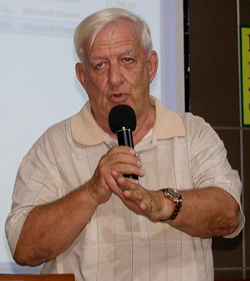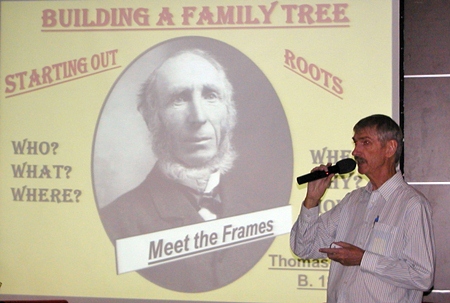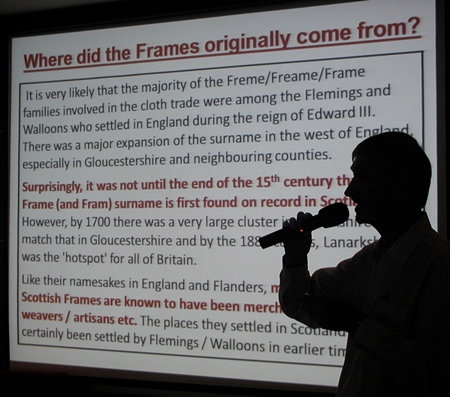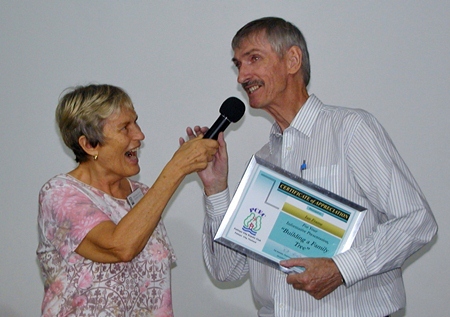Did you know that Charlie Chaplin had briefly stayed in a workhouse in England in 1896 at the age of seven? This was one of the interesting facts Ian Frame came across when he researched his family tree. No, Charlie Chaplin was not one of Ian’s ancestors. But when you research a family tree, you come across all sorts of interesting information. Ian spoke to the Pattaya City Expats Club’s Sunday, June 23 meeting about “Building a Family Tree.”
He mentioned that he has spent the last three or four months researching his family tree, and that it has completely engrossed him. Ian explained that what got him started was the fact that his father was left a box with old photos and other memorabilia. Further, as he got more into it, he realised that he wanted some history, not just the tree. He was curious about when his ancestors lived, where they lived, what work they did, how long they lived, how large the families were, and what made them move. He was also interested in whether any of them were famous or even infamous.
 Member Roger Fox advises fellow members of his progress finding ‘best value’ cruises to many parts of the world. Although very successful at this in the past, Roger says the current status is ‘still looking’.
Member Roger Fox advises fellow members of his progress finding ‘best value’ cruises to many parts of the world. Although very successful at this in the past, Roger says the current status is ‘still looking’.
Ian said that he traced his family tree back 428 years to 1585, a total of 13 generations. And that was just the tip of the iceberg, he added. He could have gone back much further. In addition, Ian explained, he had to restrict his search to direct ancestors and descendants; otherwise, it would have been an endless exercise. Ian learned that his family came from Holland, where they were involved in the cloth trade; they moved to Gloucester, England at the time of Edward VII (1841–1910); and they then moved north to Scotland where there was plenty of wool. Further, in the 1881 census in Scotland, there were 1,184 Frames listed.
Ian said that he could see from his family tree that three or four hundred years ago, particularly, but even as recent as 150 years ago, having a large number of children was common. He thought that this was probably due to the fact that as he noted with his ancestors, many children died very young. Further, he also observed that often the name of a young child who died was then given to the next one to be born into the family.
Another interesting fact he brought up was that some of his ancestors, if they lived long enough, died in workhouses for the poor. People ended up in a workhouse for a variety of reasons. Usually, it was because they were too poor, old or ill to support themselves. This may have resulted from such things as a lack of work during periods of high unemployment, or someone having no family willing or able to provide care for them when they became elderly or sick.
Ian observed in his research that some of his ancestors emigrated from Scotland to Australia. He noted that in 1849, the passage by boat cost only two pounds for a farmer who was between 14 and 40 years of age. For a child under 14, it was just one pound. And if you were an inmate, as some of his ancestors were, it was even cheaper (free!). Although that may be true for some, Ian said other of his ancestors were notable people. For example, John Frame founded Barclay’s Bank in 1690 and Fred Frame won the Indianapolis 500 race in 1932.
 Speaker for Pattaya City Expats Club for June 23rd was amateur genealogist Ian Frame. Ian has studied his family’s history & its travels across many continents. He shared many interesting facts he discovered incidentally, such as the fact that Charlie Chaplin spent some time in a poor house, as a seven year old.
Speaker for Pattaya City Expats Club for June 23rd was amateur genealogist Ian Frame. Ian has studied his family’s history & its travels across many continents. He shared many interesting facts he discovered incidentally, such as the fact that Charlie Chaplin spent some time in a poor house, as a seven year old.
Ian had the following advice for people wanting to construct a family tree: (1) identify the earliest family member(s) you can – preferably born pre-1900; (2) if possible provide associated birth date and year; (3) provide the place of birth (as a minimum, the country); and (4) enter this data into a search site, such as Google (general) or Family Search (specialises in this area). Ian added that entering the maiden name of a great grandmother might help as a cross reference.
 ‘Framed’ by his presentation, Ian shares with PCEC members how he began his search into his family origins. The trigger for Ian’s mission was a box of old photos left to him by his father.
‘Framed’ by his presentation, Ian shares with PCEC members how he began his search into his family origins. The trigger for Ian’s mission was a box of old photos left to him by his father.
Family Search, which he recommended, is a website set up by the Mormon Church, it is free, and can be used to find information for people of any faith or ethnic group. Ian said that he tried to stay clear of sites that charged for the service as there are many other sources of information on the Internet, such as electoral rolls, passenger lists, wills and testaments, and government censuses.
 PCEC Chair Pat Koester thanks Ian for his excellent presentation, with a Certificate of Appreciation. Following Ian’s very interesting talk, PCEC members established a genealogy special interest group.
PCEC Chair Pat Koester thanks Ian for his excellent presentation, with a Certificate of Appreciation. Following Ian’s very interesting talk, PCEC members established a genealogy special interest group.
During the question and answer portion, one person mentioned that parish and cemetery records are another good source for information on one’s ancestors. Another person suggested ancestry.com as a useful site; although it requires payment for some information, it is possible to obtain quite a bit of information for free.
After Ian’s presentation, Master of Ceremonies Richard Silverberg updated everyone on upcoming events and then called on Judith Edmonds to conduct the Open Forum, where questions are asked and answered and comments made about Expat living in Thailand.
To learn more about the Pattaya City Expats Club and their many activities, visit www.pattayacityexpatsclub.com.




